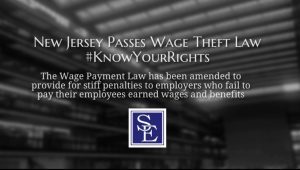A recent gubernatorial task force has released a report addressing a major problem that many employees are facing across the state of New Jersey. According to the Report of Governor Murphy’s Task Force on Employee Misclassification, 12,315 employees were improperly classified as independent contractors, rather than employees, in 2018. This misclassification can cause major issues for workers by limiting their access to essential legal protections provided to New Jersey employees. There has been a growing trend of misclassification, with the number of employees misclassified as independent contractors increasing by 40% over the past decade. Unfortunately, this trend continues to create problems for workers across the State to this day, which is why Governor Murphy’s task force was so greatly needed.

Generally, in order to determine whether a worker is properly classified as an employee or an independent contractor for wage payment law and wage and hour law purposes, New Jersey courts utilize what is known as the ‘ABC Test.’ The ABC Test starts off with a presumption that a worker is an employee. An employer can rebut this presumption only if they can establish the existence of each of the following three factors:
- The worker is free from control or direction in the performance of their services, both under the contract and in fact;
 New Jersey Employment Lawyers Blog
New Jersey Employment Lawyers Blog


